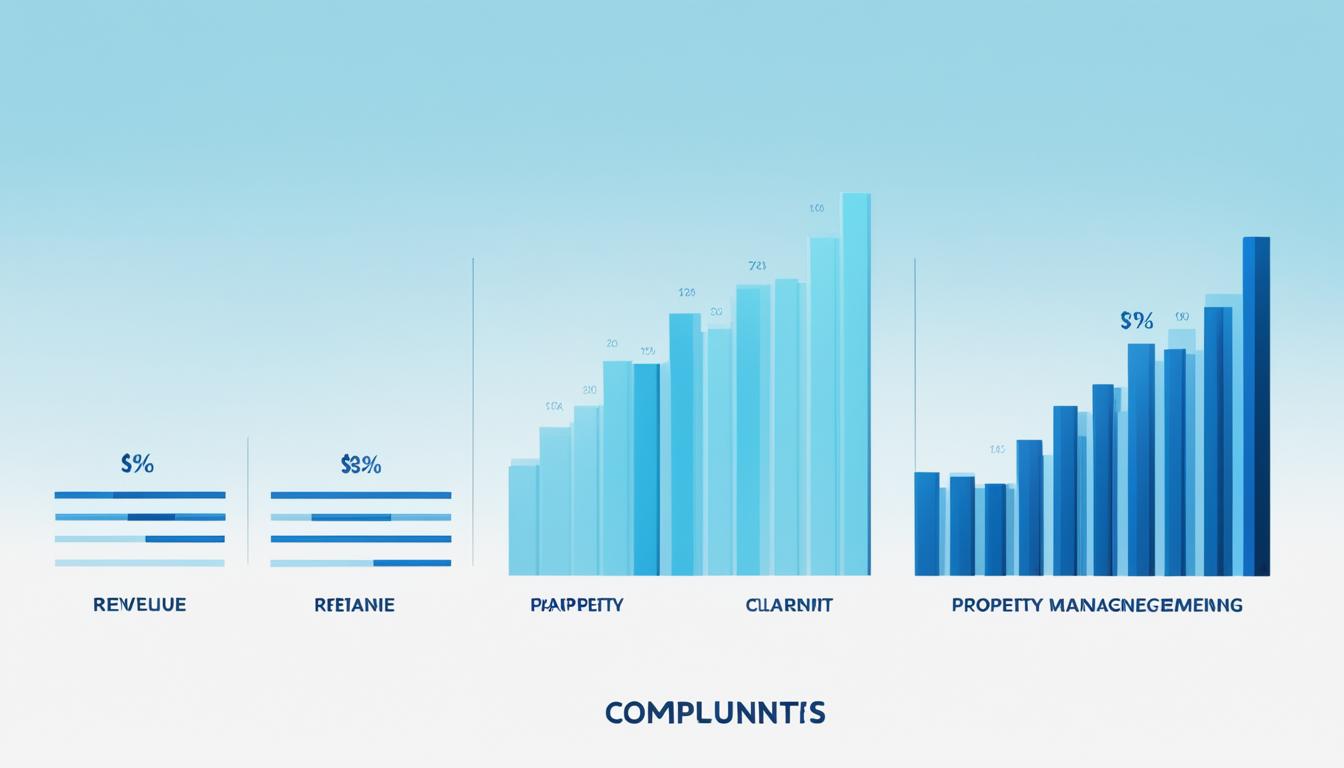Valuing a wealth management firm is a critical step in various business transactions, such as mergers and acquisitions. Knowing the true worth of a company ensures informed decision-making and successful negotiations. In this comprehensive guide, we will explore the key aspects of valuing a property management company, including appraisal methods, factors that influence fair market valuation, and the different types of valuation approaches.
Key Takeaways:
- Valuing a property management company is crucial in mergers, acquisitions, and other business transactions.
- The fair market valuation method provides an objective view of a company’s value.
- Understanding different types of valuation and their advantages is essential for accurate assessment.
- Factors like market trends, historical performance, competition, regulatory environment, and financing availability influence fair market valuation.
- Methods for fair market valuation include the market approach, income approach, asset approach, and cost approach.
Introduction to Fair Market Valuation
Fair market valuation is a critical process in determining the price at which a business would change hands between willing buyers and sellers. This valuation method considers the relevant facts and assumes that neither party is under any pressure to buy or sell. By taking into account various factors such as financial performance, industry conditions, and market trends, fair market valuation provides a comprehensive and objective view of a company’s worth. It plays a crucial role in aiding informed decision-making by accurately determining the value of a company.
The process of fair market valuation involves analyzing the financial performance of a company, which includes reviewing its historical and current financial data. By understanding the company’s revenue, profit margins, and growth projections, an evaluator can assess its potential future earnings. Additionally, the valuation takes into consideration industry conditions and market trends to determine the impact they have on the company’s value.
“Fair market valuation provides a comprehensive and objective view of a company’s worth, aiding in making informed decisions.”
The goal of fair market valuation is to provide a fair and accurate assessment of a company’s value based on the prevailing market conditions. It ensures that both buyers and sellers are knowledgeable about the company’s worth, allowing them to negotiate prices effectively. This valuation method also serves as a benchmark for potential investors and lenders, helping them evaluate the company’s financial health and investment potential.
When determining company value through fair market valuation, it is crucial to select appropriate valuation methods. These methods typically include the market approach, income approach, asset approach, and cost approach. Each method has its own merits and should be used based on the specific context and characteristics of the company being evaluated.
Valuation Methods
- Market Approach: This method compares the valuation of the company to similar businesses that have recently been sold in the market. It considers the prices paid for comparable companies to determine a fair market valuation.
- Income Approach: The income approach calculates the value of a company based on its potential future income. It considers factors such as projected revenue, profitability, and cash flows to determine the company’s worth.
- Asset Approach: This approach evaluates the value of a company based on the current value of its tangible and intangible assets. It takes into account factors such as real estate, equipment, intellectual property, and brand value to assess the company’s overall worth.
- Cost Approach: The cost approach determines the value of a company by evaluating the cost of replacing its tangible and intangible assets. It considers the cost of rebuilding or reproducing the company from scratch, taking into account factors such as labor, materials, and intellectual property.
By utilizing these various valuation methods and considering factors such as financial performance, industry conditions, and market trends, fair market valuation provides a comprehensive and objective assessment of a company’s worth. It plays a crucial role in facilitating informed decision-making and ensuring transparency in business transactions.
Understanding the Different Types of Valuation
When it comes to determining the worth of an asset or business, there are different types of valuation methods that can be used. Each method offers unique insights and advantages based on the specific circumstances. Let’s explore the key types of valuation:
-
Market Valuation
Market valuation involves comparing the asset or business to similar ones that have recently been sold. By analyzing market trends and recent transactions, market valuation provides an estimate of the asset’s value based on real-world market data.
-
Income Valuation
Income valuation focuses on the future income potential of an asset or business, especially in the case of private companies. This method considers factors such as projected cash flows, profitability, and growth prospects to determine the present value of the asset.
-
Asset Valuation
Asset valuation involves assessing the current value of the physical assets associated with an asset or business. This can include real estate, machinery, inventory, and intellectual property. By considering the fair market value of these assets, asset valuation provides an estimate of the overall worth of the asset or business.
-
Cost Valuation
Cost valuation evaluates the cost required to replace an asset or business. It takes into account the expenses involved in acquiring equivalent assets and establishing similar operations. Cost valuation is particularly useful when determining the value of unique or specialized assets.
Understanding the different types of valuation methods allows businesses to choose the most suitable approach based on their specific needs. Whether it’s assessing market trends and recent transactions, evaluating income potential, considering asset values, or examining replacement costs, the right valuation method can provide valuable insights for informed decision-making.

Factors that Influence Fair Market Valuation
When it comes to fair market valuation, there are several key factors that can influence the value of a wealth management firm. Understanding and analyzing these factors allows for a more accurate assessment of the firm’s worth. Let’s explore the factors that play a crucial role in fair market valuation:
Market Trends
Market trends, such as changes in demand for specific products or services, have a direct impact on the valuation of a wealth management firm. Keeping a close eye on market trends helps in understanding the potential growth and profitability of the firm. For example, a firm that offers innovative services in a rapidly growing niche market may be valued higher than those operating in stagnant or declining sectors.
Historical Performance
Historical performance is a significant factor considered in fair market valuation. This includes evaluating a firm’s past financial performance, both positive and negative, and its ability to adapt to changing market conditions. A consistently strong track record of growth and profitability can positively influence the valuation, while a history of underperformance may have the opposite effect.
Competition
The level of competition within the wealth management industry can impact fair market valuation. A highly competitive market can put pressure on firms to differentiate themselves and offer unique services or value propositions to attract clients. Valuations may be affected by how a firm positions itself in the market and its ability to effectively compete against other players.
Regulatory Environment
The regulatory environment plays a crucial role in fair market valuation. Changes in tax laws, compliance requirements, and other regulations can directly impact the value of certain assets and the overall financial health of a wealth management firm. Keeping abreast of regulatory changes and their potential impact on the valuation is essential to ensure accuracy and compliance.
Financing Availability
The availability of financing options can influence the demand and value of a wealth management firm. Factors such as interest rates, lending policies, and investor sentiment can impact the ease with which potential buyers can secure financing for acquisitions. A favorable financing environment can increase demand and potentially drive up the valuation.
“Market trends, historical performance, competition, regulatory environment, and financing availability are crucial factors that play a significant role in fair market valuation.”
By carefully considering these factors and conducting thorough analysis, a more accurate and comprehensive fair market valuation of a wealth management firm can be achieved, allowing for well-informed decision-making when it comes to buying, selling, or investing in such firms.

Methods for Fair Market Valuation
When determining the fair market value of a wealth management firm, several methods can be utilized to ensure an accurate assessment. These methods consider various aspects of the company’s operations and assets, providing comprehensive insights into its value.
The Market Approach Method
The market approach method compares recent sales prices of similar businesses in the industry to determine the value of the wealth management firm. By analyzing transactions in the market, this method takes into account the prevailing market conditions and establishes a fair market valuation based on real-world data.
The Income Approach
The income approach involves valuing the wealth management firm based on its potential income generation. This method considers factors such as historical financial performance, projected revenue, and the profitability of the firm. By assessing future income potential, the income approach provides a forward-looking perspective on the company’s value.
The Asset Approach
The asset approach determines the value of the wealth management firm by evaluating its current assets. This method takes into consideration tangible assets like property, equipment, and investments. By assessing the value of these assets, the asset approach provides a tangible and objective measure of the company’s worth.
The Cost Approach
The cost approach assesses the value of the wealth management firm based on the cost of replacing its assets or business. This method considers the expenses associated with reproducing or recreating the company’s operations. By evaluating the cost of rebuilding the firm, the cost approach provides an alternative perspective on its fair market valuation.
Each of these valuation methods has its own advantages and can be employed depending on the specific context and requirements of the valuation process. The use of multiple methods can also provide a more comprehensive and well-rounded assessment of the wealth management firm’s fair market value.

Valuation Services in the Real Estate Industry
Valuation services play a crucial role in the real estate industry, providing insights beyond financial assessments. These services involve a comprehensive analysis of factors that contribute to a property’s worth, ensuring precision in property assessment. By examining market trends, property features, and location characteristics, property valuation services can determine the true value of a property.
With precision in property assessment, investors in the real estate industry can make informed decisions. Strategic insights derived from property valuation services allow investors to navigate market volatility and seize opportunities. By understanding the true value of a property, investors are empowered to negotiate deals, secure financing, and optimize their real estate portfolios.
Compliance and due diligence are also integral aspects of property valuations. Valuation services ensure that the assessment process adheres to legal and regulatory standards. This compliance ensures that properties are assessed objectively, providing reliable information to guide decision-making.
The Importance of Strategic Insights in Property Valuation Services
“Property valuation services go beyond the numbers. They provide strategic insights into the real estate market, helping investors identify emerging trends, anticipate changes, and stay one step ahead of the competition.”
Strategic insights derived from property valuation services inform investors about the current market conditions, such as supply and demand dynamics, price fluctuations, and growth potential. These insights help investors identify lucrative investment opportunities and make informed, data-driven decisions.
Additionally, property valuation services help investors understand the risk associated with specific properties. Market volatility can have a significant impact on property values, and valuation services provide valuable information about potential risks and opportunities. By having access to strategic insights, investors can develop robust investment strategies and mitigate potential risks.

Ensuring Compliance and Due Diligence in Property Valuation
Property valuations must adhere to legal and regulatory requirements to ensure accuracy and fairness. Compliance and due diligence are crucial components of the valuation process, providing transparency and credibility to the assessment.
Compliance involves conducting property valuations in accordance with applicable laws, regulations, and industry standards. This includes considering environmental, zoning, and building code regulations. Compliance not only ensures the accuracy of the valuation but also protects all parties involved in the transaction.
Due diligence, on the other hand, involves a comprehensive investigation of the property’s legal and financial aspects. This includes researching ownership history, evaluating any liens or encumbrances, and reviewing any legal disputes related to the property. By conducting due diligence, property valuation services provide a thorough assessment of the property’s value, taking into account any potential risks or liabilities.
In conclusion, property valuation services play a critical role in the real estate industry. They provide precision in property assessment through a comprehensive analysis of market factors and property characteristics. Strategic insights derived from these valuations empower investors to make informed decisions, navigate market volatility, and seize opportunities. Compliance and due diligence ensure that valuations adhere to legal requirements and provide transparency to all parties involved. By leveraging property valuation services, investors can maximize the value of their real estate investments and make strategic moves in a dynamic market.
The Role of Property Valuation Companies
When it comes to assessing property values, property valuation companies play a crucial role. These companies bring expertise and local knowledge to the table, ensuring accurate and reliable valuations. By understanding the market dynamics, including neighborhood trends and demand-supply factors, property valuation companies can provide valuable insights into property worth.
One of the key advantages of working with property valuation companies is their commitment to data analysis. They conduct thorough assessments, leveraging data-driven approaches to determine property values objectively. This allows buyers, sellers, and investors to make well-informed decisions based on accurate evaluations.
“Property valuation companies provide objective evaluations, helping clients navigate the complex real estate landscape. Their assessments consider all relevant factors, ensuring compliance with legal requirements and industry standards.”
By enlisting the services of property valuation companies, individuals gain access to professional guidance for their real estate transactions. Whether it’s purchasing a new property or selling an existing one, these companies offer expert advice that goes beyond traditional market research.
Furthermore, property valuation companies prioritize legal compliance, ensuring that their evaluations adhere to the necessary regulations and standards. This is crucial for ensuring transparency and reducing the risk of legal complications down the line.
In summary, property valuation companies are essential partners in the real estate industry. Through their local expertise, data analysis, objective evaluation methods, and commitment to legal compliance, they provide valuable insights and guidance to clients, empowering them to make well-informed decisions and maximize their real estate opportunities.
Conclusion
Valuing a wealth management firm is vital for efficient decision-making in various business transactions. It involves understanding the intricacies of fair market valuation, different types of valuation, and the factors that influence valuation. Property valuation services in the real estate industry provide precise assessments of property worth, offering strategic insights for investors and property owners.
By partnering with property valuation companies that possess local expertise and adhere to compliance standards, accurate and reliable valuations can be obtained. Decoding the value of a wealth management firm enables informed decisions that maximize opportunities in the market, ensuring optimal outcomes for all stakeholders involved.
When it comes to valuing a wealth management firm, relying on property valuation services and their expert analysis empowers investors and property owners to make well-informed decisions. With comprehensive insights into fair market valuation, a deep understanding of valuation methods, and the ability to navigate factors influencing valuation, individuals can confidently navigate the complex world of wealth management. By leveraging accurate and reliable property valuations, stakeholders can seize opportunities, mitigate risks, and achieve their financial goals.
FAQ
What is fair market valuation?
What are the different types of valuation methods?
What factors influence fair market valuation?
What methods can be used for fair market valuation?
What are valuation services in the real estate industry?
What is the role of property valuation companies?
Why is valuing a wealth management firm important?
Source Links
- https://fastercapital.com/content/Valuation–Decoding-Fair-Market-Valuation–A-Comprehensive-Guide.html
- https://www.linkedin.com/pulse/how-property-valuation-done-comprehensive-guide-tanujkrvaluer
- https://medium.com/@cbreindia4/decoding-value-the-role-and-significance-of-valuation-services-in-real-estate-46937ff1675f




No comments! Be the first commenter?